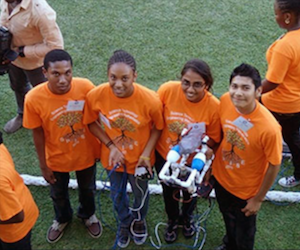Turning on the Light
Carolyn Cadogan, a PhD student in Physics at Western University, is shining light on science, in the laboratory and in the community. Growing up in Bridgetown, Barbados, Cadogan saw first-hand the substantial need to create more educational and occupational opportunities in the fields of science. “Everyone seems to stray towards law or accounting in Barbados,” says Cadogan, “So why not science? It is so captivating and offers lifelong learning possibilities.”

Her personal approach to addressing the situation resulted in Cadogan becoming a teaching assistant for the Student Program for Innovation in Science and Engineering (SPISE), a new initiative in Barbados at the time striving to encourage students to pursue STEM careers. The four-week long program recruits some of the most talented students across the Caribbean, potentially the next-generation of science leaders to engage in intensive, university-level work. The program is run by the Caribbean Science Foundation, which also offers science internships and camps for younger students to rouse interest in science. Cadogan has become a role model to aspiring science students, actively bridging gaps in her community and underscoring the importance of science education.
For Cadogan, “physics is like the God of science,” Cadogan laughs. “It’s all around us, and I need to know more.”
After receiving her Bachelor of Science in Physics and Mathematics in Barbados, Cadogan came to Western University to pursue a Master’s degree and within a year began Doctoral studies under the supervision of professors Lyudmila Goncharova and Peter Simpson.
Focused on condensed matter and materials physics, Cadogan investigates the optical properties of silicon nanoparticles, specifically silicon quantum dots. “These quantum dots (QDs) are nanoscale semiconductors made of silicon, which is a non-toxic and highly abundant material. They have unique optical and electrical properties but do not currently produce enough light, affecting their application in solar cells, microchips, and LED screens used for phones and tablets,” says Cadogan. The goal of her research is to determine which conditions affect the light output of these nanoparticles, and in turn, find the optimum conditions that will emit the most light.
Once her research is solidified, Cadogan anticipates the work she and her colleagues in the Physics department have completed may facilitate the development of high efficiency devices. “The silicon quantum dots can be used in making screen displays, which would be a non-toxic and more affordable alternative as compared to the LCD screens currently on the market,” says Cadogan. What her research comes down to is making silicon more applicable to various optical devices.
Whether Carolyn Cadogan becomes a professor or collaborates with industry, she is clear that her calling lies in science. “I plan to go back to Barbados at some point to continue working with the SPISE program as a way of investing back into my community,” says Cadogan. The program is still in its infancy, and requires more funding and internship opportunities to continue to grow. Cadogan hopes to actively support SPISE and the program’s students as their passion and skill in science blossom, and in so doing, help mold the next generation of aspiring scientists.

